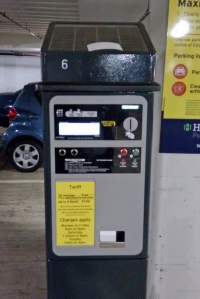Albert Einstein allegedly said:
“Everything should be as simple as possible but no simpler”
The constant drive for efficiency and effectiveness has encouraged the use of standardised solutions in situations where similar issues or events need to be handled but we need to take care that we don’t over simplify our approach or over-standardise our solutions. Perhaps we need to take note of this observation:
“Rules are for the obedience of fools and the guidance of wise men.”
Harry Day – Royal Flying Corps First World War fighter ace.
A short story to illustrate the risk s.
s.
An early morning visit to a local town-centre supermarket led me to park in their underground car park. The store offers short-term parking at competitive rates and the fee is refunded to shoppers who make modest purchases. The system is managed using a pay and display system which dispenses a ticket and a voucher for the refund.
Approaching the nearest machine, I noted that it was out of order as was the next nearest. Looking round the car park, I spotted two security men at one of the more remote machines and decided to approach them. I asked whether that machine was out of order too. Their response took me by surprise. “They are all out of order at this time of the morning, until we have replaced the batteries – they are solar powered!”
This system has been in place in both the above ground and basement car parks for at least 10 years.
Some observations:
- The design and selection of the pay and display machines was probably appropriate to the most of the locations in which they were required – but clearly not all. The choice of a standardised solution is also understandable but perhaps it would have made sense to have considered the situations where the standard design would not be appropriate.
- There are mains powered items in the basement, lighting, signage but did anyone do an analysis to compare the cost of running cables to the machines with the cost of changing the batteries every day?
- What does it say about the culture of the organisation and the engagement of the staff if this situation was not reported to the management [or perhaps it was reported but not acted upon]
- Many organisations outsource their facilities management, one could question whether these arrangements encourage the reporting of such absurdities and whether the people employed in these roles have any incentive to report them.
- Does this demonstrate an organisation which knows how to learn and improve?
Do you have any problems caused by inappropriate standardisation?
Would your people report it to the appropriate manager?
Would any action be taken?
What do your customers think when they spot this type of situation?
